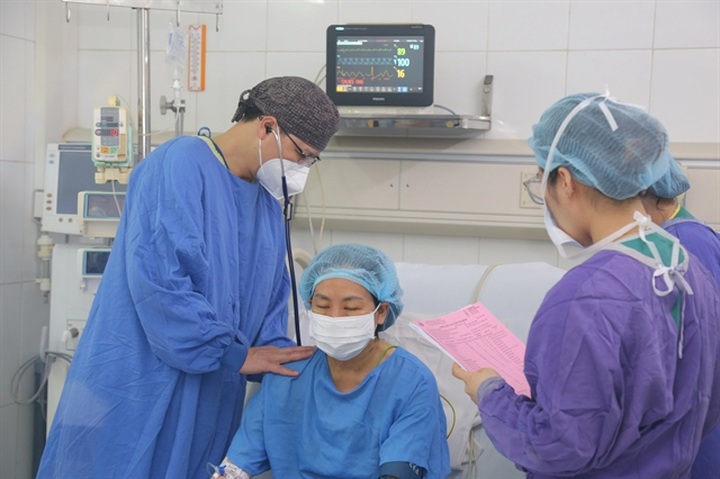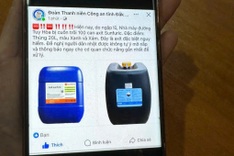Doctors at the Vietnam-Germany Friendship Hospital in Hanoi have been telling reporters of their success in completing a first-time liver transplant for a patient with acute liver failure (ALF).

Lưu Quang Thùy, director of the Anesthesia and Resuscitation Center, Vietnam-Germany Hospital, checking patient H. post-surgery. — Photo suckhoedoisong.vn
Dương Đức Hùng, director of the Vietnam-Germany Hospital, told the media that the success of the surgery on April 22 was a great landmark for Vietnam's healthcare system.
The female patient, T.T.H., went to the National Hospital of Obstetrics and Gynecology (NHOC) in Hanoi for her fourth IVF embryo transfer, having failed in her last three attempts.However, after the transfer H. felt tired, with a loss of appetite and nausea, as well as beginning to exhibit slurred speech and agitation. H. sought medical attention at the NHOC where she showed elevated liver enzymes and the absence of pregnancy in the uterus, prompting her transfer to Bạch Mai Hospital for emergency treatment.
The patient's condition deteriorated rapidly.
Within just six hours, she fell into a deep coma, became delirious, developed jaundice, severe bilateral lung damage and required mechanical ventilation. She was diagnosed with acute liver failure, grade II hepatic encephalopathy, with a background of unclear hepatitis B history.
She was transferred from Bạch Mai Hospital to Vietnam-Germany Hospital with a diagnosis of acute liver failure – hepatic coma with a background of hepatitis B and was recommended for a whole liver transplant.
"On the brink of a life-and-death battle with end-stage liver failure, when all hope seemed to have faded away, a miracle happened for her, a suitable liver became available from a brain-dead donor," said Nguyễn Quang Nghĩa, director of the Organ Transplantation Centre, Vietnam-Germany Hospital.
The liver donor was a 48-year-old male patient who suffered from traumatic brain injury due to a traffic accident. After testing, the Expert Council of Vietnam-Germany Hospital convened and determined that this was a case of brain death.
According to Nghĩa, despite knowing that the possible success rate of liver transplantation for H. was not high, the doctors at Vietnam-Germany Hospital fought every minute in the operating room to save the patient's life.
"On the liver transplant waiting list, there are quite a few people. The doctors hesitated because if they performed the transplant for this patient, other patients would have to wait longer.
"However, if effective intervention is not carried out, the patient will die within about 48 hours, so the hospital leadership decided to proceed with the liver transplant for patient H," said Hùng.
A miraculous recovery
Lưu Quang Thùy, director of the Anesthesia and Resuscitation Center, Vietnam-Germany Hospital, said that after nine tense hours, the surgery ended successfully and the function of the transplanted liver had recovered.
"Normally, with other liver transplant cases, doctors do not use strong antibiotics but this patient who was previously in the intensive care unit, infected before surgery and in a coma, the risk of infection was high. We prescribed antibiotics early, which was very effective," said Thùy.
"The patient was completely conscious after five days and can communicate well. As of today, we confirm that the liver transplant has been successful," said Thùy.
This success further reaffirms the high healthcare reputation of Vietnam-Germany Hospital and demonstrates the expertise of Vietnamese doctors in organ transplantation, which is now approaching the global standard.
Vietnam-Germany Hospital has now successfully performed 120 liver transplants, 98 of which were from brain-dead donors, mostly for patients on the waiting list.
"The successful liver transplant for patient H from a brain-dead donor opens up a new lease on life for many patients and also promotes the development of organ transplants in the Vietnamese healthcare sector as a whole and specifically at Vietnam-Germany Hospital," said Hùng.




















